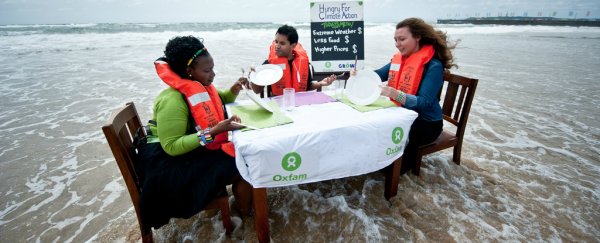This article was written by Will J Grant and Erin Walsh from the Australian National Centre for the Public Awareness of Science at the Australian National University. It was originally published by The Conversation.
At the end of Return of the Jedi, Luke Skywalker sits down with Princess Leia to let her in on two troubling secrets. The first is that Darth Vader is his father. The second is that she, Leia, is his long-lost sister. Leia looks at him warmly and replies: "I know. Somehow, I've always known."
Well, guess what. When it comes to climate change, it turns out we're a little bit like Princess Leia - somehow, it seems, we've always known.
We have just published an analysis that shows a couple of interesting ways in which we humans have responded to rising global temperatures.
It turns out that, as well as tree rings, corals and other traditional proxy indicators of climate change, the history of global warming also shows up in humans' literary endeavours.
By the book
The backstory lies with Google. A bit over a decade ago, Google began a grand project of digitally scanning all of the books. By 2011 it had scanned 15 million books (about 12 percent of all books published) and had enough data to start doing interesting things. One of the interesting things was to build what Google calls the Ngram Viewer.
Based on a subset (about 5 million) of the scanned books, Google then indexed all phrases of five words or fewer (it calls them n-grams) in order to analyse our cultural record in quantitative ways. This has given rise to a new field called 'culturomics' - the numerical analysis of trends in social concepts such as slavery, genetic engineering, and climate change - and the words we use to describe them.
While trends in word choice may be difficult to explain, it's plain from a quick look at the Ngram Viewer that the topics we discuss correlate with events of the physical and social worlds. We can see, for example, major peaks in the use of the word "earthquake" in the years immediately following the 1906 San Francisco and 1931 Fuyun earthquakes:
But climate change represents a far more abstract concept than the physical immediacy of an earthquake. So while we can easily see trends in mainstream discussion of climate change itself (see below), we wanted to know if the Ngram data might show an actual impact of climate change on human society. To answer this, we looked at a range of known climate change impacts - such as heat waves, floods, cyclones - and compared with the temperature record.
What we found surprised us. Some of the correlations between changes in the use of these words and the temperature record stand out a mile. Here are some of the fun ones.


Here are some numbers for the numbers-focused people.
What our analysis broadly shows is that writers of all sorts of books were more frequently discussing unusual climate phenomena such as heat waves and flooding, long before climate change was talked about, and even before warming was systematically recorded.
Of course correlation does not (as our friends in the comment threads will doubtless note) imply causation. It is impossible to rule out linguistic changes or some other causative factor in driving the changes in the discussion of heat waves, flooding and unusual weather the Ngram data point to. Yet these strong correlations (among the strongest are "unusual weather" and "heat wave") show the growing impact of climate change on society, as reflected in literature.
Meanwhile, the accompanying rise in discussion of several predicted effects of climate change, such as drought and flooding, shows that the cumulative impacts of climate change have already been making themselves felt.
What is interesting is that this social evidence is unconnected with the traditional physical forms of data used to demonstrate climate change. Although it might be tiresome to highlight this, such physical evidence has come under sustained political attack.
As such, buttressing the physical record with social evidence presents a useful political counterargument. After all, why else would we as a society collectively decide to discuss heat waves, flooding and drought just that little bit more?
Will J Grant, Researcher / Lecturer, Australian National Centre for the Public Awareness of Science, Australian National University and Erin Walsh, Postdoctoral fellow, Australian National University.
This article was originally published by The Conversation. Read the original article.
